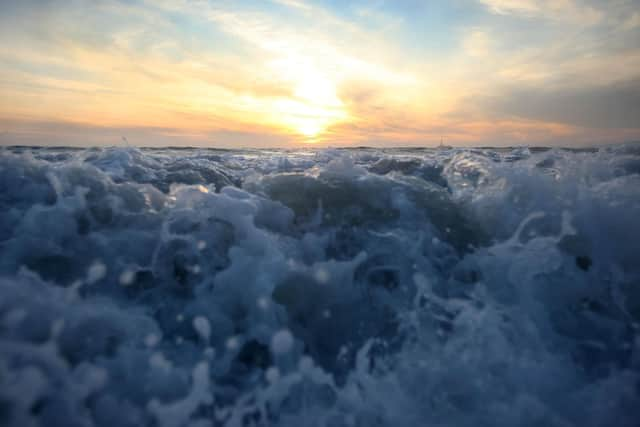Climate change: Ocean has huge effect on Scotland's climate, yet it remains our biggest blindspot – Professor Nicholas Owens
This weather event was remarkable for two things: record temperatures of over 40 degrees Celsius in England and nearly 35C in Scotland; and also how accurately they were predicted.
Some forecasts predicted the heatwave three weeks ahead and, a few days in advance, we knew specifically when and where these events would occur. The timeliness and accuracy of these forecasts helped to minimise disruption and ensure the safety of people and property.
Advertisement
Hide AdAdvertisement
Hide AdIt is likely that had the forecasts not been available there would have been a much greater impact on society and loss of life.
How was this foresight achieved? Very simply, because of the now-impressive accuracy of weather forecasting. It isn’t too long ago that forecasting the weather was the butt of jokes – many will remember the “barbeque summer” that turned out to be the wettest on record – but the skill (as it is scientifically described) of the computing models that lie behind the forecasts has improved by leaps and bounds in recent years.
There are many reasons for this: better understanding of how the weather works through first-class science – much of it from the UK – and the staggering enhancement of computing power, to name two.
But a vital element is the abundance of data to ‘feed’ the models. No matter how sophisticated the models, they are nothing without the data to drive the mathematical equations that create them.


It is, therefore, a data deficit that limits our ability to predict what our seas will be like in the years and decades to come. The UK has around 200 weather stations and hundreds of other unofficial sites feeding data into the Met Office.
By comparison, we have ten equivalent stations for the ocean. These ocean observation stations are supplemented by other data sources, notably from satellites. However, while satellite data of the sea (about, for example, its temperature) are incredibly valuable, satellites provide information only about the sea surface. There is a pressing need to match the levels of data on the land through sustained physical observations in the sea.
But why do we need these data? The sea has a constant and profound effect on our lives. It influences our weather and its plethora of marine plant life produces every second breath of oxygen we take.
Its power and ferocity has led to coastal erosion and has made us all familiar with the terms ‘sea-level rise’ and ‘flood defences’.
Advertisement
Hide AdAdvertisement
Hide AdClimate change is often perceived as a long-term adjustment, but the pace of change has accelerated dramatically in recent times, making extreme weather events more likely and more frequent.
Our ocean is a major driver of climate, as it transports heat via vast water currents. It therefore has a huge stake in how the climate will change. Only by measuring and understanding these changes can we predict the future implications for ourselves and for the vast ocean ecosystem. This, in turn, will greatly improve our ability to plan for the future and develop our coastline and public infrastructure accordingly.
Considering the ‘goods and services’ the sea provides for society, such as food, transport and recreation, the economic value of the sea amounts to trillions of pounds and yet we pay scant regard to measuring and understanding it compared with the investments we put into land. And the financial value of the sea is only one driver: what value can we and should we place on the moral responsibility we have for the custodianship of the sea?
Ignorance is no longer an excuse for complacency – we know enough of the ‘known unknowns’ to act. We know what measurements we should be making but there is the absence of a plan (although this could be produced very easily) and its funding is low priority – out of sight, out of mind.
We at the Scottish Association for Marine Science deploy a robotic autonomous underwater vehicle, known as a glider, which transits from the Hebrides to Iceland and back on missions that take six months.
During this time, the glider measures the ocean’s physical properties from the surface to 1,000m depth. These measurements are crucial to understand if the ocean currents off Scotland are changing in the face of climate change; with huge consequences if they are.
This is world-leading research but we know we really need a fleet of such instruments if we are to provide sufficient data to match the weather predictions. We had for many years scientific instruments on a buoy off the island of Tiree, making long-term measurements of a sea area of importance for Scotland. Yet, it currently sits in our laboratory ashore, silent because of the absence of sustainable funding.
If we look beyond these examples, Scotland has a sea-area of nearly half a million square kilometres, around six times the land area and yet we are almost blind as to what is happening to it.
Advertisement
Hide AdAdvertisement
Hide AdIf we wish to have any insight into the future to prepare for short-term needs, or arguably more importantly the changes ahead because of climate change, we need urgently to rebalance our priorities. If we cannot now find the means to create a long-term ocean monitoring programme to help improve our modelling and predictions, then future generations will have to pay a much heavier price.
Professor Nicholas Owens is director of the Scottish Association for Marine Science
Comments
Want to join the conversation? Please or to comment on this article.
